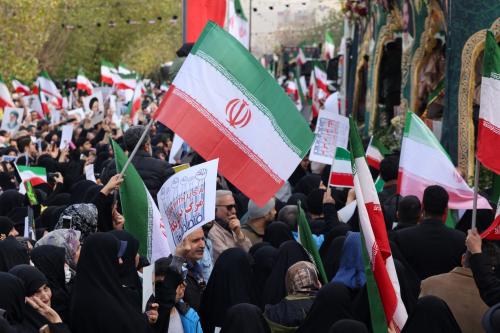The United States and Israel have both approached their dealings with Iran with a failed paradigm: the belief that greater pressure and more aggression will force Tehran to capitulate, when the likelier outcome would be to provoke a similarly militant response, write Bruce Riedel and Anelle R. Sheline. This piece was originally published by Responsible Statecraft.
Israeli officials in Washington on Thursday reportedly urged the United States to launch strikes against Iranian targets, in what would be an unprecedented escalation of hostilities. Defense Minister Benny Gantz and Mossad chief David Barnea pushed the Biden administration to engage in military action in order to get Iran to “soften its position at the negotiating table.”
While the talks in Vienna have yielded little progress, this appeal marks just the latest example of the failed paradigm with which both the United States and Israel have approached Iran: the belief that greater pressure and more aggression will force Tehran to capitulate, when the likelier outcome would be to provoke a similarly militant response.
Israel says it is under an increasingly dire threat, prompting President Herzog to assert, “If the international community does not take a vigorous stance on this issue, Israel will do so. Israel will protect itself.” Yet neither Israel nor the United States would be in this position if Trump had stayed in the deal, or if Biden had swiftly rejoined it upon taking office.
Retired Israeli General Isaac Ben Israel told Bloomberg that “Netanyahu’s efforts to persuade the Trump administration to quit the nuclear agreement have turned out to be the worst strategic mistake in Israel’s history.” With this statement, Ben Israel admitted that not only did Israel undermine its own security by pushing for Trump to renege on the JCPOA, but also that Israel undermined America’s security, as both countries share an interest in preventing Iran from acquiring a nuclear weapon. Such behavior is unacceptable from a partner. Unfortunately, Israel’s current Prime Minister Naftali Bennett is adopting much the same posture on Iran as his political rival and predecessor, Benjamin Netanyahu.
If the Biden administration takes Israel’s advice, or, perhaps more likely, if Israel launches attacks that provoke an Iranian response and Washington gets dragged into the conflict, what would happen?
An Israeli strike on Iran will likely start a conflict that pulls in neighboring countries on both sides. Hezbollah will launch thousands of rockets, missiles, and drones at Haifa, Tel Aviv, and other targets. Hamas might also join the conflict. Iran or its Iraqi and Yemeni partners could strike Saudi Arabia as they have in the past; they might also expand attacks to include Bahrain and the United Arab Emirates, given their now publicly normalized ties with Israel. Oman, Kuwait, and Qatar, which have tended to maintain relations with both Iran as well as the rest of the GCC and the United States, will be pressed to choose a side, a decision that will subject them to attack from their new adversaries. Jordan would be in a bind, given the enormous popular pressure to break the peace treaty with Israel. Oil prices would skyrocket.
If the war escalated, the United States might feel compelled to invade and try to hold Iranian territory. But as regional expert Kenneth Pollack once quipped, “If you liked the Iraq War, you’ll love the Iran War.” Indeed, Iran’s population is three times larger than Iraq’s was in 2003. Iran’s terrain is more mountainous and therefore challenging for an occupying force to control. Iranian nationalism is grounded in millennia of Persian civilization, so the splintering of national identity observed in Iraq is unlikely. While some might mistakenly imagine Iranians welcoming the fall of their authoritarian government, experiences in Iraq, Afghanistan, Somalia, Vietnam, etc. should remind us that foreign invaders are rarely welcomed. Iran lost a half million lives fighting Iraq in the 1980s, in what Iranians believe was an American-inspired war to destroy their revolution, which only rallied citizens behind the regime.
Iran has already withstood decades of U.S. sanctions, including the past three years of “maximum pressure”: instead of fomenting a popular uprising against the government, as some American Iran hawks persist in believing, that strategy has empowered hardliners who now control all of the regime’s major institutions. This is due in major part to the widespread perception that then-President Rouhani’s willingness to trust that the Americans would uphold their commitments under the 2015 nuclear deal was naive. Indeed, even before Trump pulled out of the deal, Iranians’ hopes for a post-sanctions economic boom were disappointed, as many sanctions remained in place and more were added.
This is not the first time Israel has expressed panic about Iran, nor is it the first time tensions have run high. Yet at some point, through arrogance or error, military confrontation is more likely than not. Israel is not at existential risk from Iran. Tehran is well aware that Israel has its own nuclear arsenal with the capability to deliver weapons by American-built aircraft, French-inspired missiles, and German-built submarines.
In their recent expressions of regret that Netanyahu exhorted then-President Trump to withdraw from the 2015 nuclear deal, other senior Israeli national security officials — most of whom are no longer in office — have suggested the need for a different approach. Although they may have felt dissatisfied with the deal at the time, they now say the JCPOA was the only measure that ever successfully checked Iran’s nuclear program. Director of Central Intelligence William Burns says there is no evidence that Iran has embarked on weaponizing its nuclear program, and an effort to do so would take one to two years.
American officials need to avoid talking themselves into a dead-end where the only two choices are doing nothing or going to war. U.S. interests would be better served by engaging in a rational discussion of the issues that divide us from Iran than issuing threats that if Tehran does not comply with a deal we violated there will be heavy consequences. Washington should also be clear with Tel Aviv that an Israeli attack on Iran or Iranian targets would have serious negative implications for the U.S.-Israel relationship.
The Trump administration — egged on by Netanyahu — made an enormous mistake by violating the JCPOA. It destroyed an emergent American dialogue with Iran that offered to de-escalate tensions in the region and gave Iran an excuse to restart parts of its nuclear program that the JCPOA had boxed in. It also rightly raised concerns about the integrity of American commitments. The consequences of this violation are now coming home to haunt us. It is time for honest and thoughtful discussions with ourselves and our partners, not full-throated threats that will have their own dangerous results.
The Brookings Institution is committed to quality, independence, and impact.
We are supported by a diverse array of funders. In line with our values and policies, each Brookings publication represents the sole views of its author(s).








Commentary
Op-edWhy bombing Iran is (still) a bad idea
December 14, 2021